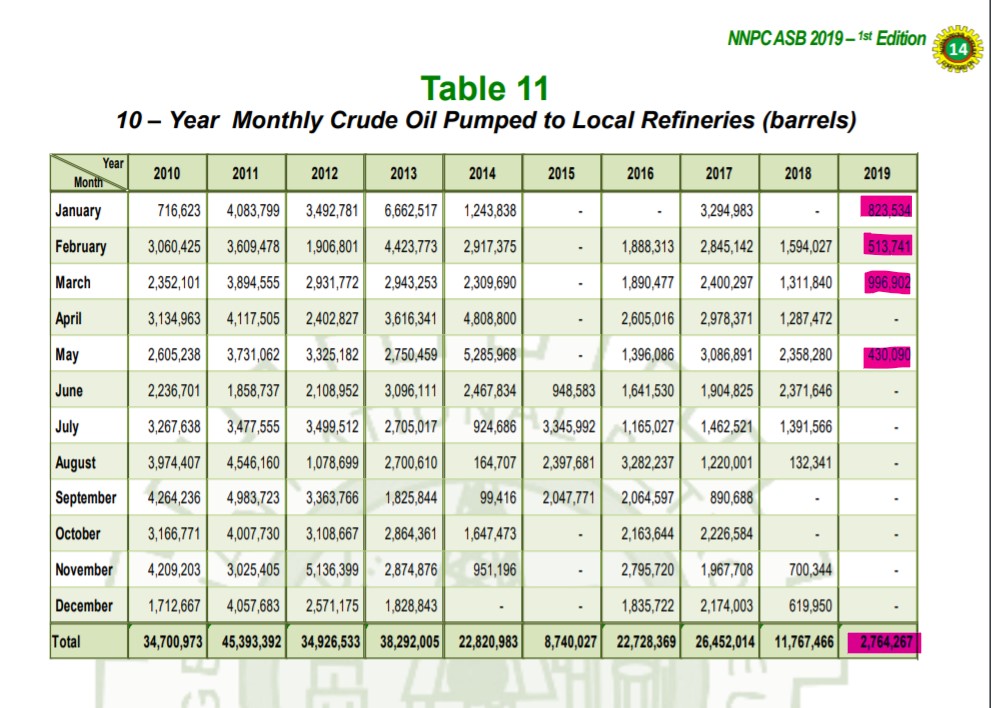The Nigerian National Petroleum Corporation (NNPC) has failed to account for 104.48 million barrels of domestic crude oil it lifted in 2019.
In the year under review, NNPC lifted a total of 107.24 million barrels as domestic crude, out of which it only accounted for 2.76 million barrels. Thus, the corporation failed to account for 97.4% (104.48 million barrels) of the total domestic crude lifted.
By virtue of their responsibilities and functions, Paragraph 110 of the Financial Regulations grants the Accountant General and Auditor-General or their representatives free access to books, accounts and information of all federal ministries or extra ministerial offices and other arms of government.
They are also entitled to require and receive from members of the Public Service any information, reports and explanations they consider necessary to enhance the performance of their functions.
In line with this, the Auditor General of the Federation, Aghughu Adolphus went through the books and accounts of the NNPC and discovered that the corporation did not provide information about 104.48 million barrels of crude oil that was lifted as domestic crude in 2019.
The 2019 NNPC-NAPIMS audited annual report and financial statement showed that 107.24 million barrels of crude oil were lifted as domestic crude.

Out of the 107.24 million barrels, only 2.76 million barrels were allocated to local refineries, as stated on page 17 of the NNPC 2019 Annual Statistics Bulletin. This happened between January-May as shown on this table.

According to the Auditor-General’s report, the 2.76 million barrels allocated to the domestic refineries were valued at N55.89 billion.

The Auditor-General noted that information about the whereabouts or sales of the remaining 104.48 million barrels of crude oil was not provided. Even more worrisome is the silence of the management of the NNPC to the queries of the Auditor-General. Thus, raising the fear that the unaccounted barrels of the domestic crude or the money from its sales may have been diverted.
A similar situation played out in 2011 when NNPC was unable to account for 65,000 barrels of crude out of the 445,000 barrels allocated to it daily, costing the country the sum of N1.033 billion daily and N31.005 billion monthly.
Implications
Outlining the risks of the millions of barrels of crude oil that the NNPC did not provide information about in 2019, the Auditor-General raised the issue of loss of revenue to the Federation Account.
Last year, at a media parley, Austin Avuru, the Chief Executive Officer of Seplat Petroleum Plc noted that the country’s 2019 budget performance indicates that the percentage of total budget revenue from the oil sector is decreasing.
While other factors may have contributed to that, the unaccounted 104.48 million barrels of crude oil lifted in 2019 may have also been responsible for the decrease in oil sector revenue contribution to the country’s total budget.
The Auditor-General stated that the 2.76 million barrels was valued at N55.89 billion. Relying on this valuation, the unaccounted 104.48 million barrels will be valued at N2.112 trillion. It could therefore be inferred that the country lost or can’t find N2.112 trillion in 2019. Thus, leading to more borrowing for the government to finance its budget and other critical infrastructures in the country especially since oil and gas is still one of the biggest revenue earners for the government.
Asides from the loss of revenue to the Federation Account, the practices of not accounting for the whereabouts of million barrels of crude oil or the money generated from the sales of the un-utilized ones could dim the confidence of investors in the new NNPC (as a registered company).
Following the signing of the Petroleum Industry Bill (PIB) into law by President Muhammadu Buhari in August, the Minister of State for Petroleum Resources, Timipre Sylva stated that the NNPC will become a commercial company.
With the current operations of the company especially as highlighted by the audit report, there is no assurance that the same practices which have held the company insolvent will not continue.
Some years ago, the NNPC reported losses that led to the insolvency that mandated a new structure but with a chunk of funds or millions of barrels of crude oil unaccounted for, the country is still on a path of fiscal challenges.
A Dataphyte report had exposed how tax credit amounting to N1.4 trillion was granted by the corporation. This further reveals possible reasons why the previous corporation may have encountered financial difficulties and failed to meet responsibility towards the revenue of the country.
The Way Forward
The Auditor-General has outlined a number of pertinent issues in the 2019 Audit report that the government should pay strenuous attention to.
To avert issues of loss of revenue to the Federation Account, the government should adopt the recommendations put forward by the Auditor-General and most importantly, apply sanctions relating to failure to collect and account for government revenue as stated in paragraph 3112(ii) of the Financial Regulations.





